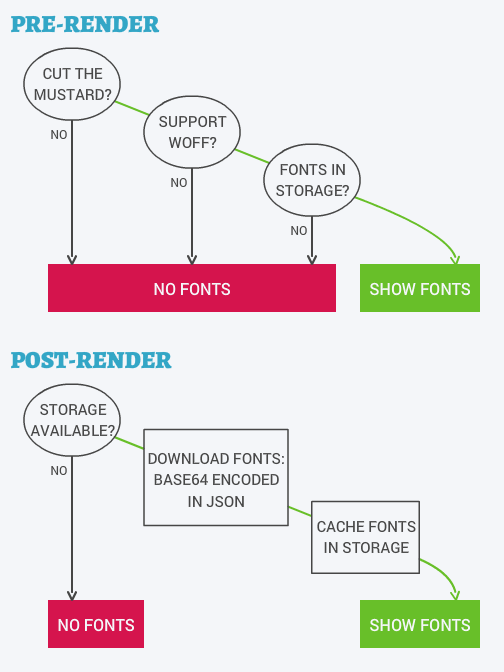I work at a game publishing company called SpilGames and in the past 6 months or so we redesigned some of our game portals, a part of that redesign was a custom web font. At the same time we were constantly trying to improving page load times and we had to remove the web font because this was a blocking request.
I was dedicated to bring that font back, with the following requirements:
- No blocking request, e.g. to Google Fonts
- No loading of font resources before the page is rendered
- Normalizing browser inconsistencies1 to what is considered best approach
- Use caching so resources only need to be downloaded on first page load
Something I learned from The Guardian
Obviously we are not the only one trying to improve web font performance. During an in-house workshop Vitaly Friedman showed how The Guardian uses JavaScript to load and store their web fonts. Using JavaScript you have more control over when to retrieve the web fonts and how to cache them, independent of what browser your user is using. Their logic is divided in pre-render and post-render.

“Cut the mustard” is a simple test to detect whether or not the browser is reasonably modern and looks something like:
var isModernBrowser = (
'querySelector' in document &&
'localStorage' in window &&
'addEventListener' in window
);
I did not find a solution how to test WOFF support2 but I did find a way to test for WOFF2 support, I will get to that later. For now, Internet Explorer 8 doesn’t support WOFF, however it’s already excluded by the “cut the mustard” test. The other browsers that don’t support WOFF will still download (and cache) the file but only once, which is not that bad. I guess you can do some simple User Agent sniffing to detect Opera Mini and older Android browsers but I won’t go there… not for now at least.
Converting fonts to JSON using base64 encoding
To store a web font in LocalStorage we need to convert the font to a string using base64 encoding. I made a tool to do all that work for you, it’s called font-store and available on npm. It’s very basic for now but gets the job done. All you need is to supply a link to a CSS file with font resources in WOFF format (any Google Fonts link will do) and the tool will fetch those resources, base64 encode them and create a JSON file with two keys. The value key contains the CSS file contents with the font resources base64 encoded. For cache busting you also need a fingerprint, that’s why the md5 key contains the md5 hash of the value.
Caching and retrieving fonts from LocalStorage
On first page load we want to fetch the web fonts and store them in LocalStorage. We do that after the page has rendered using the load event. The script has to be in the head element because on subsequent page loads we want to apply the web fonts before anything is rendered.
When working with LocalStorage make sure to catch inevitable errors.
var md5 = 'e90ba95faca6e63b5516ed839f4514ec',
key = 'fonts',
cache;
function insertFont(value) {
var style = document.createElement('style');
style.innerHTML = value;
document.head.appendChild(style);
}
// PRE-RENDER
try {
cache = window.localStorage.getItem(key);
if (cache) {
cache = JSON.parse(cache);
if (cache.md5 == md5) {
insertFont(cache.value);
} else {
// Busting cache when md5 doesn't match
window.localStorage.removeItem(key);
cache = null;
}
}
} catch(e) {
// Most likely LocalStorage disabled
return
}
// POST-RENDER
if (!cache) {
// Fonts not in LocalStorage or md5 did not match
window.addEventListener('load', function() {
var request = new XMLHttpRequest(),
response;
request.open('GET', '/path/to/fonts.json', true);
request.onload = function() {
if (this.status == 200) {
try {
response = JSON.parse(this.response);
insertFont(response.value);
window.localStorage.setItem(key, this.response);
} catch(e) {
// LocalStorage is probably full
}
}
};
request.send();
});
}
A working demo can be found on CodePen.
Better compression with WOFF2
With a little bit extra effort you can take this even further, with WOFF2. WOFF2 offers better compression resulting in a 25 to 50% (30% on average) decreased file size over WOFF. Even though WOFF2 is not supported by that many browsers yet3, it might be worth it to use feature detection4 and serve WOFF2 to capable browsers.
var format = (function() {
if (window.FontFace) {
var fontFace = new FontFace('t', 'url(data:application/font-woff2,) format(woff2)', {});
fontFace.load();
if (fontFace.status == 'loading') {
return 'woff2';
}
}
return 'woff';
})();
The third argument for the FontFace constructor is supposed to be optional but some browsers (Chrome 35 and 36, Opera 22 and 23) throw an error if omitted.
At the time of writing font-store doesn’t output WOFF2 yet, but that will change.
What about Internet Explorer 8?
I tried adding an EOT font but even with the base64 encoding under the Internet Explorer 8 limit of 32kB5, I couldn’t get it to work. If you can get it to work please let me know, that would be greatly appreciated.
-
Seems like “Use a system font immediately while the webfont loads. When it does, change the font” is the most popular way browsers could handle FOUT with web fonts. ↩
-
WOFF is pretty much supported by all modern browsers. ↩
-
WOFF2 is currently only supported by Chrome and Opera but that’s still almost 40% of all browser usage. ↩
-
A simple feature test for the WOFF2 font format. ↩
-
Data URI length in Internet Explorer 8 is limited to 32kB. ↩